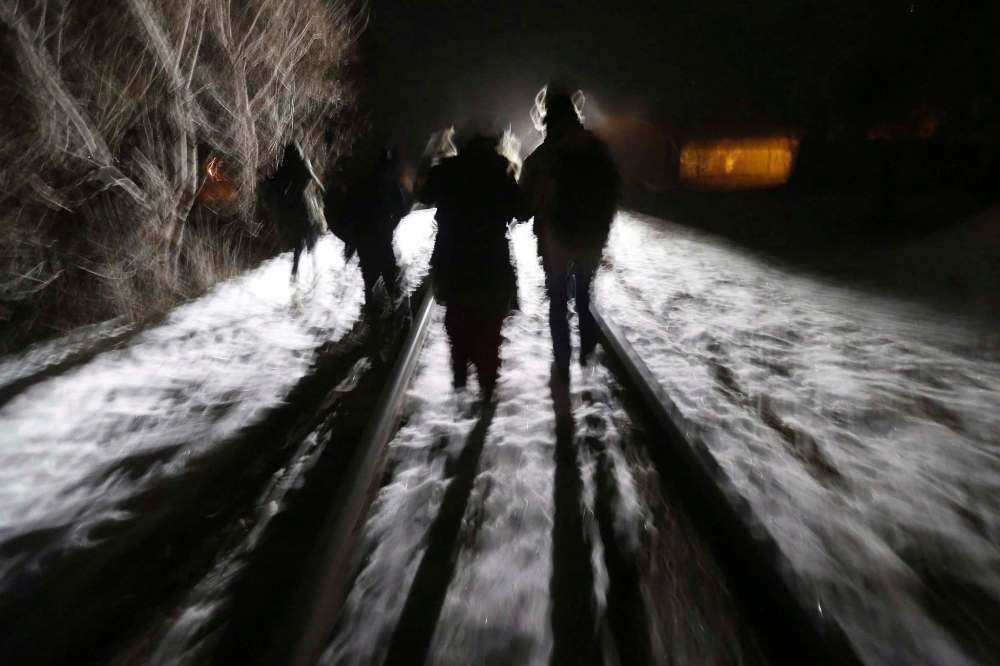Many asylum seekers coming to Canada had U.S. cases denied
Lawyer says tighter restrictions lead to higher rejection rate south of the border
Advertisement
Read this article for free:
or
Already have an account? Log in here »
To continue reading, please subscribe:
Monthly Digital Subscription
$0 for the first 4 weeks*
- Enjoy unlimited reading on winnipegfreepress.com
- Read the E-Edition, our digital replica newspaper
- Access News Break, our award-winning app
- Play interactive puzzles
*No charge for 4 weeks then price increases to the regular rate of $19.00 plus GST every four weeks. Offer available to new and qualified returning subscribers only. Cancel any time.
Monthly Digital Subscription
$4.75/week*
- Enjoy unlimited reading on winnipegfreepress.com
- Read the E-Edition, our digital replica newspaper
- Access News Break, our award-winning app
- Play interactive puzzles
*Billed as $19 plus GST every four weeks. Cancel any time.
To continue reading, please subscribe:
Add Free Press access to your Brandon Sun subscription for only an additional
$1 for the first 4 weeks*
*Your next subscription payment will increase by $1.00 and you will be charged $16.99 plus GST for four weeks. After four weeks, your payment will increase to $23.99 plus GST every four weeks.
Read unlimited articles for free today:
or
Already have an account? Log in here »
Hey there, time traveller!
This article was published 11/03/2017 (3197 days ago), so information in it may no longer be current.
A large number of asylum seekers entering Manitoba have either abandoned or had their cases denied in the United States, a Minneapolis immigration lawyer says.
The asylum process is stricter and takes much longer in the U.S., causing some people to look to Canada, Kara Lynum said.
“It sounds like a fair number of these folks did have asylum cases here, and they were either denied or decided to abandon the process and go to Canada,” she said.

Only 18 per cent of all asylum cases are approved in the U.S. and the rate is as low as 10 per cent in many parts of the country.
“There are really high denial rates in large parts of our country,” Lynum said.
In Minnesota and North Dakota, a little more than 25 per cent of asylum applicants were approved from 2011 to 2016. Lynum described that rate as “terrible.”
In Canada, about 65 per cent of asylum claims are approved.
Lynum said that shouldn’t be interpreted in a way that suggests asylum seekers pose a threat to Canada. Applicants are rarely denied for criminal reasons, she said.
More often, it’s something technical — including that they didn’t apply quickly enough after arrival, or their case didn’t meet the U.S. definition of persecution, Lynum said. A key factor in granting asylum is reasonable fear of persecution if the person is returned home.
The Trump administration has created new guidelines to deny asylum claims earlier in the process, Reuters reported this week.
Applicants losing their court hearing can still remain in the U.S. on appeal, but that can take another two to three years, Lynum said. Failing that, they are deported to their home country.
With only two judges handling asylum cases in Minnesota and North Dakota, there is also a backlog and lengthy waits to have cases heard.
There has been steady stream of asylum seekers entering Canada near the Emerson port, most of whom are coming from Minneapolis.
The migrants have been predominantly from the home country of Somalia, as well as from Djibouti, Eritrea, Ghana and Ethiopia.
U.S. President Donald Trump signed a revised executive order this week blocking entry to the U.S. for citizens from Iran, Somalia, Sudan, Yemen, Syria and Libya for a period of 90 days.
The renewed travel ban exacerbates the pessimism among immigrants to obtain legal status in the U.S., even if their homeland isn’t on the list of banned countries, Lynum said.
The travel ban “wouldn’t be a legal factor but I’m going to say it’s a factor in creating fear,” she said. “Even though it’s limited to six countries, it doesn’t feel that way to immigrants.”
Lynum said the uncertainty created by the travel ban has made migrants so desperate as to try to cross the border in the worst weather conditions imaginable.
“These are people who are scared and they’re really fighting for their lives. This culture of immigration enforcement and all this rhetoric about immigration in the U.S. is just ratcheting up pressure on them,” she said.
In some cases, the asylum seeker may be waiting three to four years just for their case to be heard and they can’t bring family over until their case is decided. “So some of these people might have given up and said, you know what? I can figure something else out because my family’s not safe where they are and I need to get them out of there,” Lynum said.
The migrants, some of whom arrived during a severe winter storm this past week, don’t check the weather before they try to cross. “They just go. It really speaks to how seriously they take the threat of returning to their country,” she said. “They’re already in a really tenuous situation as far as being concerned about their safety and not being deported back to their countries.”
However, Lynum advises her clients against irregular entry into Canada.
It’s unsafe — particularly in these conditions — and it could create roadblocks if they want to return to the U.S. to visit family, she said.
bill.redekop@freepress.mb.ca
History
Updated on Saturday, March 11, 2017 7:19 AM CST: Edited


